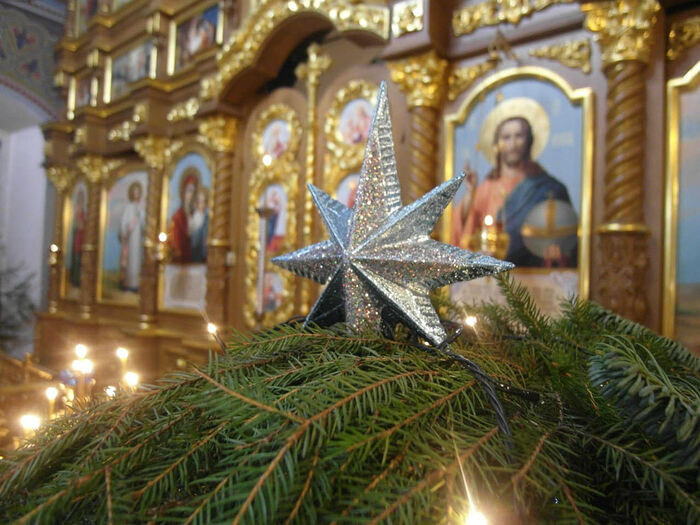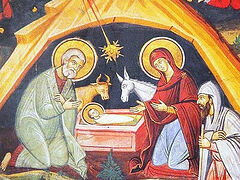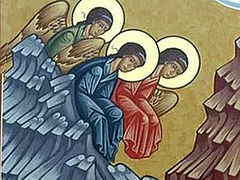Again, brethren, we have been vouchsafed the grace-filled “visitation” of the Lord (Lk. 19:44). Great and joyous is the present day. The prayers and hymns of the holy Church breathe an ineffable spiritual triumph, especially now, when “Heaven and earth are united” and truly “angelically bring praise” to God in the highest, although with the “unworthy lips” of many of its children. The very walls of the Church are as if not what they were, and have received the imprint of this celebration, as if all delights and rejoices, “every breath praises the Lord.” On this great day, the joy of the Lord increases among the pious and faithful, pouring forth streams of joyous renewal and purity into their souls from the grace-filled “visitation” of the Lord; and even the souls of people who almost always forget the Lord remember Him more this day; frozen souls seem to thaw, and all that is deadened within them seems to feel the touch of new life. And here, the holy Church, gathering “under her wings” (Mt. 23:37) even more children than usual (although, alas! not always), prays that the imprint of the blessed “visitation” of the Lord not soon be obliterated, that the gift of praise brought by those who have gathered might be pleasing to Christ, that they might remain above sin, preserved from the machinations of the enemy, and that they might not destroy the traces of the Lord’s “visitation.” “Graciously accept, O Benefactor, the praises of Thy servants, and bring down the despiteful and haughty looks of the enemy. O blessed Lord Who sees all, raise us up far above sin, and establish Thy singers firm and unshaken upon the foundation of the faith.”1
When we purchase some expensive fragrance, brethren, then we zealously take care of it. We know you can’t leave a vessel with a fragrant perfume open, because it will quickly dry out. What else is our soul on this day but a vessel fragrant with the grace of the Holy Spirit? How carefully must we keep these holy words of the Church hymns, through which we receive the grace of the Spirit of Christ—thoughts and feelings that our inattentive ears, worn upon our spiritually lazy bodies, managed to catch! Will any trace of the grace-filled joy, of the breath or influx of Christ’s purity in our souls remain if we aren’t vigilant over ourselves, if we open the doors of all our external senses (sight, hearing, etc.) so the winds of all kinds of temptations and stinking passions can freely blow in, and the fragrance of the holy could easily waft out through these open doors? Oh, let us not be like the ungrateful Jewish race, which saw God appear in the flesh, and was so ungrateful to their Benefactor who appeared! How sad it is if many Christians don’t even recognize, like the Jewish people, “the day of their visitation” by Christ, and they feel nothing in their souls and their souls remain indifferent and unfeeling, as on other ordinary days.
Now is not the time to condemn, but the time or opportunity to grieve and worry can always present itself. Because of the iniquity of the people, the Lord promised to turn their feasts into sorrow, to abhor their feasts, for He said: Bring no more vain oblations; incense is an abomination unto Me; the new moons and sabbaths, the calling of assemblies, I cannot away with; it is iniquity, even the solemn meeting. Your new moons and your appointed feasts My soul hateth: they are a trouble unto Me; I am weary to bear them (Is. 1:13-14). And it came true. For on the day of the Lord’s solemn entry into Jerusalem, the people exalted and rejoiced over their King coming into Jerusalem, and the Lord wept, beholding Jerusalem, because now He, having been received with such enthusiastic joy, had to reject the city and the Temple with the people and their feasts. Therefore, brethren, let us not hope that the Lord will receive us all equally for the sake of the feast. He stretches forth His hands to all and gathers them to Himself, but only those who give their hearts, and with them their entire lives to Christ, the “source” of their life, will remain with Him. Without this, our house will be “empty,” and the holy Church will rejoice with incomplete joy if only its walls and the angels rejoice on this day while the hearts of people remain more unresponsive than the walls that reflect the sound coming to them. The grace of the feast is great, but grace, according to the Apostle, can also be “in vain” (1 Cor. 15:10, 2 Cor. 6:1), when the heart doesn’t freely respond to its call, but is captured by the earthly passions and doesn’t want to remove their shackles. How can you free a slave who loves slavery more than freedom? He’ll just make himself a slave again.
May it not be so! Let us delve into what Christ has done, so that the trace of His “visitation” to our souls would be more enduring. God appeared in the flesh on earth to renew the decrepit world; let us desire renewal, let us abhor the old clothes of the passions to which we have become accustomed, the stench and decrepitude of which we often don’t notice, while they’re noticeable to others. And how can we approach Christ in such clothing? Christ appeared to purify our souls from the poison of the passions. The poison of lust was poured into the souls of Adam and Eve when they tasted of the forbidden fruit and violated the one commandment. And how much of this poison do we perceive, constantly tasting the forbidden fruit—things that please our souls but contradict the will of God, which is constantly announced to us by our constantly trampled-upon conscience? And not just one, but how many commandments we violate! Let us awaken within ourselves the desire to crush the love of this destructive poison in our souls, so as to come and instead taste of the tree of Christ’s life, to which we were called while still in Paradise. The Kingdom of Christ has been revealed in the world and in our souls; the kingdom of this world has been crushed, as the kingdoms of the world were once crushed by Christ: Babylonian, Persian, Egyptian, Roman, which was revealed to Daniel under the image of the destruction of the idol with a stone cut out without hands (Dan. 2:34), cut from the mountain (that is, by Christ, born of a Virgin without seed). Let us not enfeeble our souls and bodies with sinful captivity again, which opens the way for a new invasion of the “twenty peoples,” and even more so for the captivity of the devil, who catches in his nets the souls of living people who are in captivity to the passions and don’t heed the warnings of the holy Church about how near these nets are.
Let the present day of the “visitation” of Christ remind us of all of this. And if it reminds us and leaves an imprint in our souls, then the joy of today’s feast will turn into a reflection of eternal joy, which He came to give us in Heaven, as the lightning foretells the glow of a distant thunderstorm or the dawn the nearness of the sun itself, which will soon shine in all its power.
Amen.




